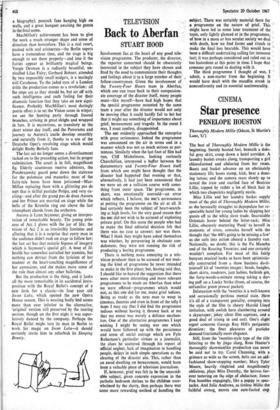Back to Aberfan
TELEVISION STUART HOOD
Involvement lies at the heart of any good tele- vision programme. The producer, the director, the reporter concerned should be obsessively interested in the subject they have chosen and fired by the need to communicate their thoughts and feelings about it to a large number of their
fellow-countrymen. Given the involvement of the Twenty-Four Hours team in Aberfan,
which one can trace back to their compassion- ate coverage of the disaster itself, many people must—like myself—have had high hopes that the special programme mounted by the same team a year after the disaster would not only be moving (that it could hardly fail to be) but that it might say something of importance about grief, bereavement and tragedy. In the event I was, I must confess, disappointed.
The BBC evidently approached the enterprise with great seriousness. Indeed the programme was announced on the air in terms and in a manner which was not so much serious as por- tentous. Similarly when the last foot of film had run, Cliff Michelmore, looking curiously Churchillian, interposed a buffer between the documentary and Twenty-Four Hours itself from which one might have thought that the disaster had happened that evening or that, alternatively, it had just been announced that we were set on a collision course with some- thing from outer space. The programme, in short, was emotionally oversold—an error which reflects, I believe, the BBC'S nervousness at putting the programme on the air at all. It had certainly been the subject of heart-search- ing at high levels, for the very good reason that the BBC did not wish to be accused of exploiting private grief. On this score the people who had to make the final editorial decision felt that there was no case to answer; nor was there. What I think they might have asked themselves was whether, by persevering in obstinate con- dolement, they were not running the risk of producing a boring programme.
There is nothing more annoying to a tele- vision producer than to be accused of not mak- ing the kind of programme he never intended to make in the first place; but, having said that, I should like to hazard the suggestion that there were other more interesting and more relevant programmes to be made on Aberfan than what we were offered—programmes which would not, as this one did for me, make grief tedious. Being as ready as the next man to weep in cinemas, theatres and even in front of the telly I hope I may say that I did find the programme tedious without having it thrown back at me that my ennui was merely a defence mechan- ism. One of the alternative programmes I kept wishing I might be seeing was one which would have followed up with the persistence and sense of social outrage which are Fyfe Robertson's particular virtues as a journalist, the clues he scattered through his report of official neglect, lack of imagination in handling people, delays in such simple operations as the clearing of the disaster site. This, rather than an awed dwelling on bereavement, would have been a valuable piece of television journalism.
If, however, grief was felt to be the unavoid- able subject, given concrete expression in the pathetic bedroom shrines to the children over- whelmed by the slurry, then perhaps there was some more rewarding method of handling the subject. There was certainly material there for a programme on the nature of grief. This might have led to some later treatment of the topic, only lightly glanced at in the programme, of how in a more or less secular society we deal with death, how we find forms and rituals to make the final loss bearable. This would have been a difficult undertaking calling for immense tact; it was perhaps considered and ruled out as too hazardous at this point in time. I hope that someone gets round to dealing with it.
The third programme I thought of was, I admit, a non-starter from the beginning. It would have dealt with the maudlin streak in nonconformity and its essential sentimentality.


































 Previous page
Previous page